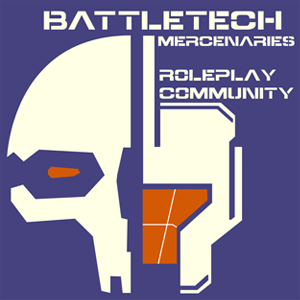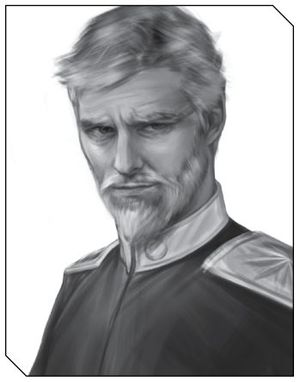Alexander Davion
This article needs to be updated with material from Handbook: House Davion, Historical: Reunification War. Once these titles clear the Moratorium period, or if they already have, please consider revisiting this article and updating it with the new material. |
Property "Update Needed From" (as page type) with input value "Handbook: House Davion]], [[Historical: Reunification War" contains invalid characters or is incomplete and therefore can cause unexpected results during a query or annotation process.
Alexander Davion (b. 18 February 2507 - d. 24 January 2600) was the only child of First Prince Edward Davion and was First Prince of the Federated Suns for most of the 26th century.[1]
Contents
Quotes
"The legacy of tyranny transcends the ages like none other. That we stood fast against the evil does not make us heroes but simply redeems us in our childrens' eyes. Yet I weep for what we have done to this beautiful jewel [of a nation]."
- -First Prince Alexander Davion in an address to the Armed Forces of the Federated Suns, September 17, 2541[2]
"We must disabuse ourselves of the notion of 'good' or 'evil' controlling us. No, instead it is we who control 'good' and 'evil'. Just as we are not slaves to fate but have a free reign to forge our own destiny, so too do we have a free hand to act as we would. Man is a noble creature. It is high time we start behaving like it."
- -First Prince Alexander Davion in an address to the citizens of the Federated Suns, December 31, 2541[3]
Biography
Early Life
Alexander Davion was the only child of Edward Davion, who had himself been the only child of First Prince William Davion. Through a combination of events, Alexander found himself named heir to the Federated Suns at the age of just 5 years old; by the time William Davion named Alexander as his heir shortly before dying of the Spotted Fever Plague, Edward Davion had already died in combat against the forces of the Capellan Confederation and Alexander's mother had died when her DropShip was destroyed off the world of Avigait. The Federated Suns High Council named five regents to oversee the Federated Suns until Alexander reached the age of marjority; these regents included his aunts, Laura Davion and Cassandra Davion, Cassandra's husband David Varnay, and General Nikolai Rostov, Prince of the Terran March.[1]
Unfortunately, the various regents proved to be more interested in furthering their own interests than they were in ruling the Federated Suns well; Alexander was kept as a hostage in all but name by Cassandra and David Varnay, and by 2525 Alexander was married to their daughter, Cynthia Varnay, as civil war erupted in the Federated Suns. Laura Davion battled the Varnays for control of the Federated Suns, while Alexander, Cynthia and their young son Vincent managed to escape from their captors, only to end up having to fight a civil war against Laura Davion, the Varnays and Nikolai Rostov's son, Dmitri.[1]
By the time a triumphant Alexander defeated all of the other claims to the throne and could rule a reunited Federated Suns the civil war had raged for thirteen years, and amongst the many casualties was Cynthia, killed by Dmitri Rostov.[1]
Marriage and Children
Alexander Davion married twice; his first marriage was to Cynthia Varnay, and lasted until her death during the civil war. Alexander and Cynthia had three children, Vincent, Roger and Melinda. Vincent and Roger were both killed in a JumpShip accident in 2596, the grief from which added to Alexander's mental decline late in life.[1]
Alexander's second marriage was to Veronique DuVall in 2544, and Alexander and Veronique had four children, Henry, Louis, Veronica and Lawrence.[1]
Age of War
Having secured the throne of the Federated Suns after the civil war, Alexander made sweeping changes to the government and military of the Federated Suns which solidified his power base; these changes included reorganising the various Marches within the Federated Suns, removing the Terran March completely. The civil war proved that Alexander was a mediocre military tactician, but he also proved to be a consummate political strategist; combined with his natural charm and negotiating skills, these qualities served him well during the civil war and conflicts with the Capellan Confederation and Free Worlds League.[1]
Alexander was one of the last rulers to agree to the formation of the Star League; with the Federated Suns economy a shambles after the civil war and the aggressive Draconis Combine continually eroding the strength of the Federated Suns, Alexander was determined that his realm would not join the Star League from a position of weakness. Ian Cameron finally convinced Alexander to join the League after years of negotiation by stipulating that in the event of an attack on the Federated Suns by the Combine the armed forces of the Star League would be committed to defending the Suns.[1]
Formation Of The Star League
Within the Star League council Alexander came under constant pressure from Hehiro Kurita, the Coordinator of the Draconis Combine, and Ursula Liao, Chancellor of the Capellan Confederation. Issues such as the ownership of those worlds that had been a part of the Chesterton Trade Federation were raised over and over again, with Ursula Liao trying various political and legal gambits to regain ownership of the various Chesterton worlds.[1]
Alexander recognised that war was inevitable for the nascent Star League, and became one of the more hawkish members of the Star League council; with war being certain, he pushed hard for the invasion Taurian Concordat, a war that would serve the Federated Suns by expanding the borders of his nation and punishing the Concordat for being a persistent thorn in his side. When Alexander later discovered that President Grigori Avellar of the Outworlds Alliance was using covert means to purchase arms, equipment and materiel for his crash armament programme in the 2570s from companies in the Federated Suns this pragmatic, political side of his character led to Alexander neither exposing nor shutting down Avellar's effort. Instead, Alexander seized on an opportunity to frustrate Hehiro Kurita and Ian Cameron and improve his own position in the Star League council by entering into covert negotations with the Alliance using his son Lawrence, negotiations that culminated in the Tancredi Accord, an agreement that would gain the Federated Suns a number of water-rich but undeveloped worlds from the Outworlds Alliance in exchange for arms, equipment, advisors and the services of a three-regiment strong BattleMech brigade that would gain both fame and notoriety as the quasi-mercenary Pitcairn Legion.[1]
Reunification War
Alexander honored his commitment to the Star League, supplying considerable forces to the SLDF campaign against the Taurian Concordat; he also honored his treaty with the Outworlds Alliance, with the Pitcairn Legion consistently defeating SLDF and DCMS forces in the Alliance and was directly responsible for seeing negotiations initiated between the Star League and the Outworlds Alliance that led to the Treaty of Cerberus, ending the war between the League and the Alliance.
Death and Aftermath
When Alexander died in 2600 he was the longest-serving ruler of the Federated Suns. Alexander had faded from public life before his death, as the strain of losing his two oldest sons in an accident and the stress of fighting first the Davion civil war and then the Reunification War took a heavy toll on him, with Alexander succumbing to a degenerative neural disorder that led to dementia. After Alexander's son Vincent died in 2596, Alexander named his grandson Ian as his heir; Ian's death at the hands of an assassin in 2599 could have plunged the Federated Suns into chaos, but in a brief period of lucidity Alexander named Ian's son Zane as his successor, and Zane duly became First Prince after Alexander's death.[1]
Positions
Story's Appearances
Alexander Davion is the main protagonist of short story "Raven" from Jason Schmetzer on writer's contest "Iron Writer"-2007.



